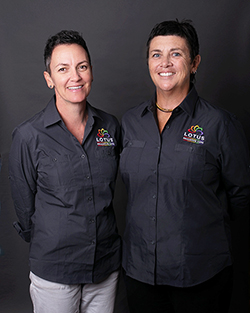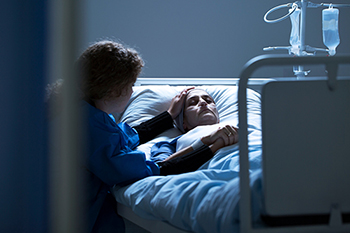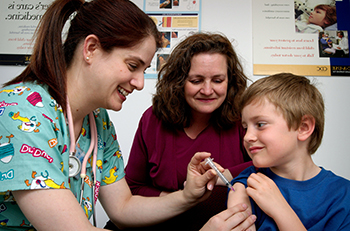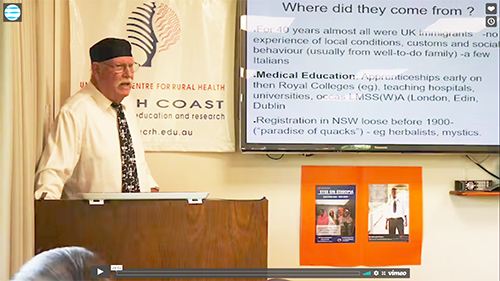
Palliative care under the microscope
Report says 1-in-100 GP consultations involve palliative care
Given the political debate around end-of-life decision making and the need for more effective and accessible palliative care the AIHW’s report Palliative care services in Australia could not have been better timed.
Before interrogating the stats let’s take a look at the terminology.
With typical verbosity the World Health Organization is quoted as calling palliative care ‘an approach that improves the quality of life of patients (adults and children) and their families who are facing the problems associated with life-threatening illness, through the prevention and relief of suffering by means of early identification and correct assessment and treatment of pain and other problems, whether physical, psychosocial or spiritual.’
In Australia, and many other parts of the world, the demand for palliative care services is increasing due to the ageing of the population and the increases in the prevalence of cancer and other chronic diseases that accompany ageing, the report notes.
‘Historically, it was assumed that palliative care would commence only once all treatment aimed at ‘curing’ people had finished or only when a person was dying. Now, it is well-accepted that there is benefit in providing palliative care in association with disease-modifying therapies that aim to prolong life.
- Details

Compassion meets clinical practice
According to Palliative Care NSW, most people say they would like to die in their homes but only 17% are able to do so. Lotus Palliative Care, a new service for the Northern Rivers region, will help more people have palliative and end of life care at home.
With decades of nursing experience behind them, Megan Paul and Lulu Shapiro believe Lotus Palliative Care can make a positive difference to the quality of life remaining for people diagnosed with a life-threatening illness or disease, and for their support people.
‘We can’t change the fact that a person is receiving palliative care,’ said Megan, ‘but we can ensure people, and their loved ones, are free from avoidable stresses such as hospital admissions.’
Assistants-in-nursing attend a home visit in the morning and provide personal care such as showering, skin integrity checks, mouth care and respite. They then convey any areas of concern to the registered nurse who attends a home visit in the afternoon to manage all the clinical care and symptoms including syringe driver management. The service works closely with the patient’s GP to ensure all symptoms, including pain and nausea and the distressing symptoms associated with a serious diagnosis, are managed well. In addition, support and respite for carers and loved ones is available.
Lotus Palliative Care is a seven-day-per-week service with overnight on-call phone support. Carers can ring day or night and speak to a Registered Nurse or troubleshoot any problem or concern.
The service is available to everyone and can be engaged at any stage – before a person even enters a clinical setting or when a choice is made to transfer back home.
- Details
- Written by: Hayley Katzen

A unique Palliative Care Service - advertorial
St Vincent’s Hospital Palliative Care Unit provides a high-quality multidisciplinary service for those living with a life-limiting illness in our Far North Coast Community.
The dedicated nine-bed Palliative Care Unit provides in-patient care for public and private patients and support for their families and carers. The Unit differs from the community service offered by Lismore Base Hospital which is best suited for acute presentations.
Multidisciplinary approach
The multidisciplinary Palliative Care Team at St Vincent’s works closely with GPs to provide quality care, compassion and a range of services. The team, including specialised palliative care nurses, supports the physical, emotional, spiritual and social needs of patients living with a life-limiting or terminal illness.
- Details

Kids and Coronavirus
As I write this in mid-October 2021 we are anticipating a ramping up of COVID-19 case numbers in paediatrics. I am on call today and as I look down my list of patients I see I have around 30 COVID-19 positive children in the community on the books, hopefully essentially well at home and receiving a daily phone call from the Hospital in the Home team here at Lismore Base Hospital.
We anticipate this number will rise into the hundreds over the next month or two and then hopefully fall. The vast majority of them will have symptoms of a cold or less and will have contracted the disease from their parents.
We do not know why children under twelve have such mild disease, and adolescents have only mild respiratory or gastrointestinal symptoms. Perhaps it is because it is a coronavirus, like the common cold, and children and adolescents are primed by this very frequently, like Jenner’s milkmaids with their cowpox.
What is known is that children are underrepresented in terms of known COVID-19 cases, which probably means we’re not testing them because they are well, even when they have the virus. As with adults, it is only the children with at least moderate comorbidities who seem to have any chance of becoming unwell or even to die. They do not pass it on very effectively either, so they behave as a vaccinated adult.
- Details
- Written by: Dr Chris Ingall, Paediatricain Lismore

Obituary - Dr Neil Thompson
Dr Neil Thompson, 7 March 1940 - 30 October 2021
Dr Neil Thompson, Lismore's first orthopaedic surgeon, passed away peacefully in Byron Bay with his wife Elaine and his children by his side. Neil was a devoted and respected doctor in Lismore for more than 25 years, serving this community and surrounds with great skill, care and compassion.
Neil's opus magnum in retirement was his book, Sawbones, Saddle Burns & Soothing Balms: Medical Practitioners in the Richmond Valley, 1866–1986, a valuable history of the local medical fraternity from 1866 to 1986.
Normag editor, Robin Osborne reviewed the book in February 2015. The launch at the Alstonville Historical Society was attended by hundreds of his friends, acquaintances and colleagues. At the 2019 Nordocs Unconference Neil recounted tales of some of our more colourful predecessors. (Default nordocs password)
- Details
Page 26 of 177















